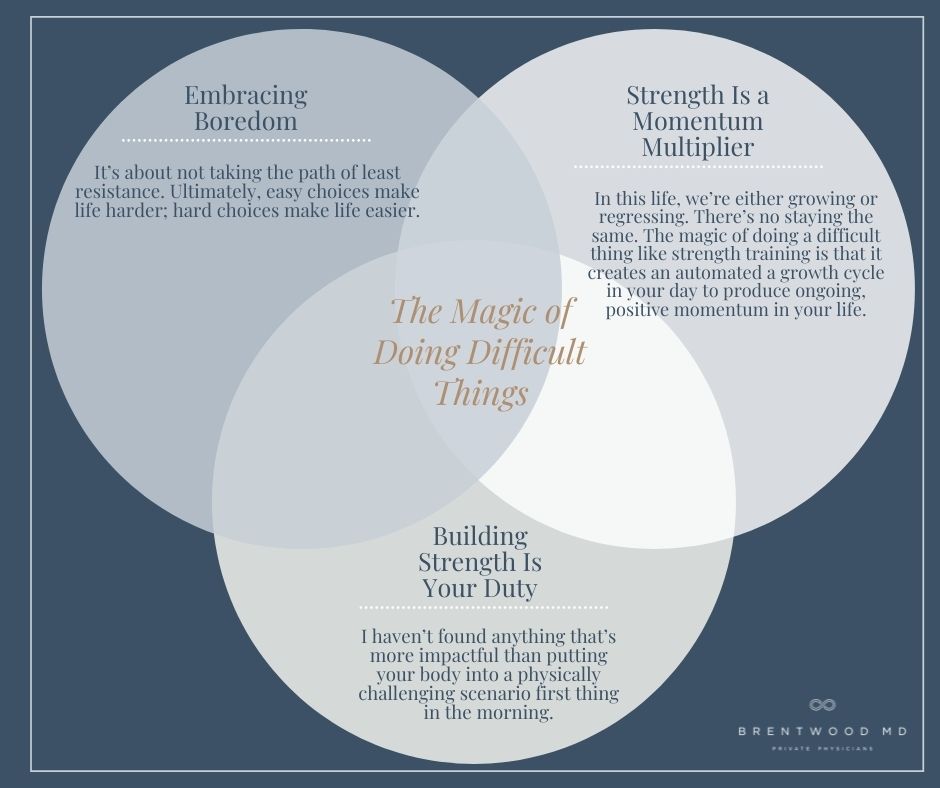Download file | Play in new window | Duration: 00:25:49 | Recorded on March 24th, 2022
One of the recurring themes in my blog and podcast is embracing the journey in life. The journey, not the destination, is where you experience, learn, grow, and derive meaning and joy.
Who you become along the way is more important than any endpoint.
But the journey is also frustrating, difficult, and sometimes even tedious. It’s a process that involves a near-constant struggle against external forces and your own inertia. Your best defense is offense: using discipline to build and renew your strength.
One of the best examples of this is strength training itself. Strength training — or any form of regular exercise — is not something most people enjoy or look forward to. In fact, most people dread it.
But they love the result.
Strength training is difficult work, but we do it because we deserve to feel strong and exercise power and autonomy in our lives. There is no better way to demonstrate your capacity for personal strength than to physically exert your body against resistance.
Simply said, powerful people do hard things. And they do them because they have a duty to themselves and to others who depend on their strength and leadership.
In this month’s podcast, I exchange stories and wisdom with the one and only Jen Justus. We discuss not only our personal experiences with strength training but also the feeling of magic we get in doing difficult things.
In many ways, it really is like magic. You suffer through a grueling physical challenge that pushes you to your limit and, voilà, like a magician pulling the rabbit from a hat, you experience optimized physical and cognitive strength for the rest of the day and sleep better at night.
Building Strength Is Your Duty
The origin of this concept came a few years ago during my journey to reclaim my physical fitness.
I came into work beaming after my morning exercise. Jen turned to me and said she was proud of me for the hard work I was putting in. But then she made this statement:
“But it’s so easy for you. You love working out.”
Surprised, I replied, “I think you’re confused, Jen. I don’t love working out. I work out because I love the results.”
This was my first articulation of a basic equation: I want the results more than I don’t want to work out.
This is important because one of the realities we confront in life — especially as we get older — is that we interact with the world through our physical bodies. You only get one go in this old body. You owe it to yourself to feel strong and function at your optimal level.
In other words, you have a duty to yourself to strengthen your body.
The sedentary, modern life conditions you to feel ineffectual and weak. The feeling of chronic weakness and stagnation affects your ability to ambulate, produce, make decisions, and develop healthy relationships.
Conversely, when you make that sacrifice of blood, sweat, and tears to push yourself physically, you condition your body and mind for peak performance. Doing this difficult thing primes you for ever-increasing strength and wellness.
I haven’t found anything that’s more impactful in establishing a tone of physical and emotional strength than putting your body into a physically challenging scenario first thing in the morning.
Embrace the Boredom
Let’s be honest: exercise is boring. It’s tedious. And it’s this drudgery that prevents many people from committing to it.
But here’s the truth: Most routines are boring. By definition, a routine is repeating the same thing over and over.
Much of our lives involve the repetition of boring, uneventful tasks. Getting up in the morning, going to work, saving money, investing in long-term assets, building a business, even being happily married for 50 years all involve embracing routine tasks to achieve outstanding results.
These activities, like working out, are part of a lifestyle. And while they may be boring, the result makes them worth the effort. Boredom is a discipline, a means to an end: success, stability, and happiness.
The trick isn’t to fall in love with working out, but to fall in love with the result. You deserve the result.
Being disciplined with money leads to financial freedom. Being disciplined with exercise leads to health and strength.
It’s about not taking the path of least resistance. Ultimately, easy choices make life harder; hard choices make life easier.
The challenge with implementing a strength training program is that in the short term, you may not notice a clear benefit from a single routine or repetition. In fact, during the early stages of a workout regimen, you’ll likely get negative feedback from your body and mind: pain, fatigue, and doubt. This makes it easy to get off track.
In his book The Dip, Seth Godin writes about overcoming temporary setbacks with persistence. Anything worth doing, he says, will have a dip that you must navigate, but you can still make measurable progress.
Here we can also invoke The Gap and the Gain principle. During the early phase of your program, it’s critical to learn the right way to measure your results. Instead of comparing yourself to a perfect future ideal that only exists in your mind, look backwards to appreciate how far you’ve come. Measuring correctly will help you notice and love your results.
Then, once you see how much doing difficult things positively influences your day-to-day experience, you’ll fall in love with the process, too.
It works like muscle memory. You begin to instinctively embrace the boredom and struggle because you know the result is bigger than the pain.
Being Strong Is a Momentum Multiplier
Building physical strength has so many direct benefits. One of the key results is the momentum it generates in other aspects of your life.
I speak often about momentum multipliers because their impact is exponential across the spectrum. They’re one of life’s bargain bins, where you really get your money’s worth. Strength training is a momentum multiplier if I’ve ever seen one.
The feeling of physical strength is elusive, especially as we get older. Like all organic systems, our bodies and minds weaken over time. Both physically and cognitively, it’s just harder to sustain productivity.
When you begin to recapture your strength, you ask yourself, What else can I do? What else is possible?
This downstream psychological impact opens up a limitless realm of potential. As your mindset, energy levels, and clarity of thinking improve, you gain the confidence to tackle other tasks that no longer seem as intimidating after your morning workout.
You bring a whole new kind of energy with you into your interactions with people, whether it’s in the boardroom, at a business meeting, or on a date. This energy sets a tone of calm but alert confidence that makes for a smoother, more productive day.
Part of this is physiological. Exercise boosts your endorphins and feel-good neurotransmitters like serotonin. And when you feel good, you’re more likely to eat better, sleep better, and make healthy choices.
In turn, nutrition, good sleep, and wellness make you feel even stronger, creating more momentum for the next day’s workout. The cycle multiplies momentum in all aspects of your life.
It even carries over into your relationships. When you start off the day feeling strong, you’re more kind, patient, and communicative. This leads to better experiences with your spouse, kids, friends, and colleagues.
How often do you wake up feeling sluggish and unmotivated? Maybe sometimes you oversleep and have to drink an extra-large coffee just to get yourself moving. You struggle the rest of the day, and maybe have a few drinks to wind down that night. Then you end up feeling bad again the next morning… and the cycle repeats.
This whole negative sequence can be avoided by starting your morning by doing a difficult thing. If you’re going to feel groggy for the first couple of hours anyway, you might as well spend that time knocking out a hard task that will make the rest of your day better.
That’s the great thing about strength training — it’s hard but simple. It doesn’t require you to think or make decisions. You simply turn on your body’s autopilot and go through the motions. When you’re finished, you reap the rewards for the rest of the day.
In this life, we’re either growing or regressing. There’s no staying the same. The magic of doing a difficult thing like strength training is that it creates an automated a growth cycle in your day to produce ongoing, positive momentum in your life.
Magic for Grownups
Many of us believed in magic as kids. Then we grew up, and the cold wind of adulthood swept that dream away.
But there’s still some magic to be found in adulthood; it just looks a little different than we imagined. Putting in the work and embracing the unexciting routine of doing difficult things, day in and day out, works its own kind of magic.
Nowhere is this more apparent than with strength building.
Once you accept strength as a duty to yourself, you become more receptive to the boredom that comes with building it. You begin falling in love with the result, which means more strength, more energy, more mobility. And eventually, you even fall in love with the process that delivers those results.
Once you have the experience of watching something difficult turn into something magical, you’ll be a believer again, just like when you were a kid.

Dr. Aaron Wenzel is a concierge physician specializing in the care of fast-moving entrepreneurs, executives, and public figures in the Nashville, TN area. Dr. Wenzel’s diverse life experience and extensive training in family medicine, emergency care, nutrition, and hormone replacement therapies give him the unique platform to provide unmatched care for his patients.








